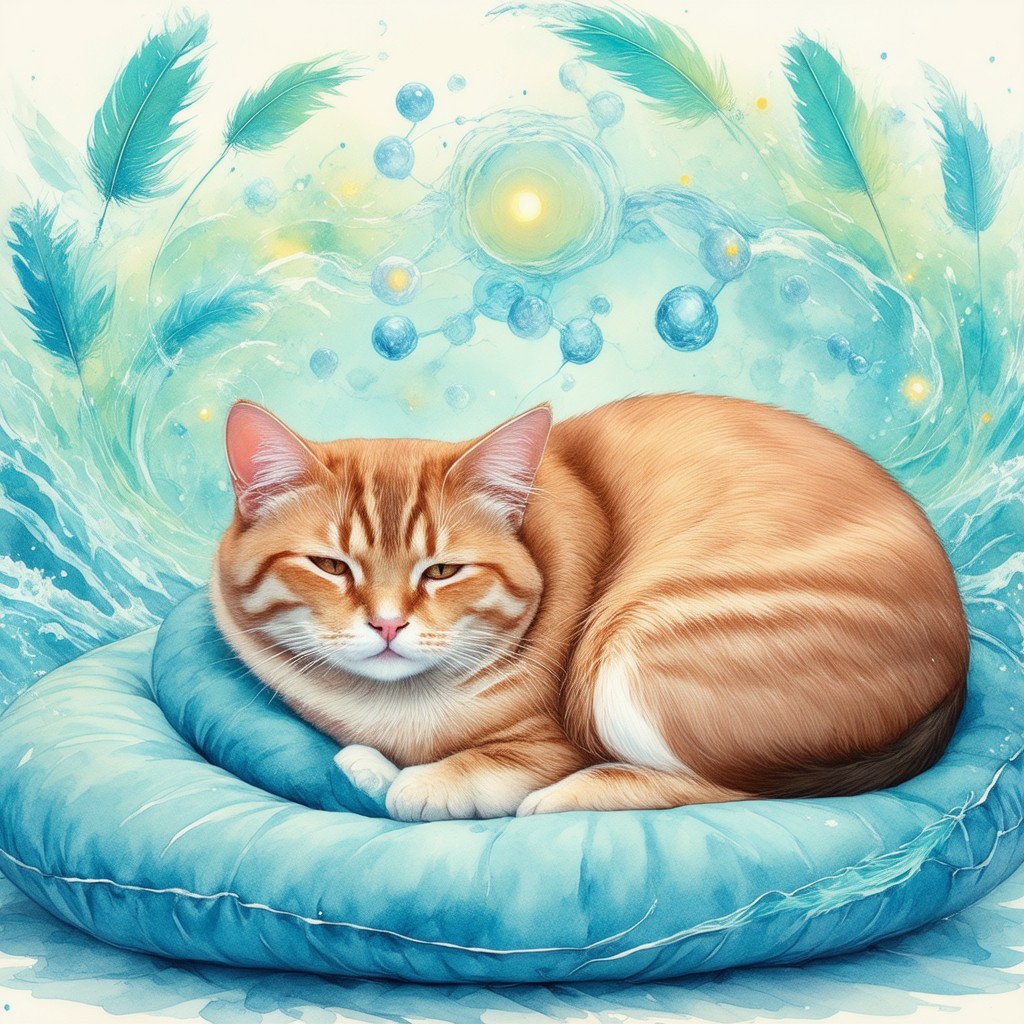Key Takeaways
- Zylkene for cats is a natural, non-sedative supplement containing alpha-casozepine that effectively reduces feline anxiety and stress-related behaviors, including pica.
- The recommended Zylkene dosage for most adult cats is 75mg daily, with effects typically noticeable after 10–15 days of consistent use for chronic anxiety.
- Zylkene has a strong safety profile with minimal side effects, making it suitable for long-term use and often preferred over pharmaceutical anxiolytics.
- Integrating Zylkene with environmental enrichment, behavioral modification, and calming care strategies enhances anxiety management and pica treatment outcomes in cats.
- Consulting a veterinarian is essential to tailor Zylkene dosage, monitor side effects, and develop a comprehensive plan for managing cat anxiety and pica effectively.
Discover the comprehensive benefits of zylkene for cats in managing feline anxiety and behavioral challenges such as cat pica. This guide delves into what Zylkene is, how it works, and why it has become a trusted choice among pet owners seeking effective calming care for cats. From understanding the appropriate zylkene dosage for cats to exploring potential side effects, we provide detailed insights to help you make informed decisions. Additionally, we compare zylkene for cats with other anxiety medications, share real user experiences including Zylkene for cats Reddit discussions, and offer practical advice on managing pica in cats through targeted treatment strategies. Whether you’re curious about the onset of action or seeking guidance on long-term use, this article equips you with everything needed to support your cat’s well-being effectively.
Understanding Zylkene for Cats: What Does Zylkene Do to Cats?
What is Zylkene and How Does It Work for Cats?
Zylkene for cats is a natural behavioral supplement specifically formulated to help manage stress and anxiety in felines. It contains alpha-casozepine, a bioactive peptide derived from milk protein casein, which works by mimicking calming substances naturally found in the brain. This compound modulates the GABAergic system, promoting relaxation without causing sedation or drowsiness. As a result, Zylkene supports cats in coping with stressful situations such as adapting to new environments, traveling, exposure to loud noises, or changes in their daily routine.
Clinically proven to reduce stress-related behaviors, Zylkene for cats improves overall well-being and quality of life by easing anxiety during vet visits, moving homes, or introducing new pets. Unlike pharmaceutical sedatives, Zylkene is non-habit forming and has a favorable safety profile, making it suitable for long-term use or alongside other treatments. Veterinarians often recommend Zylkene as part of a comprehensive behavioral management plan that includes environmental enrichment and behavior modification techniques. For best results, consistent daily administration is advised, with noticeable effects typically appearing within days to weeks.
For more information on managing feline stress and anxiety, consulting a veterinarian or certified animal behaviorist is highly recommended. Authoritative sources such as Virbac Zylkene and veterinary behavior studies provide further evidence of its efficacy and safety.
Overview of Zylkene 75mg for Cats and Its Uses
Zylkene 75mg for cats is a popular dosage form designed to deliver the optimal amount of alpha-casozepine for feline stress relief. This dosage is tailored to suit the average adult cat’s needs, making it effective for managing common anxiety triggers such as loud noises, separation anxiety, or environmental changes. The supplement is available in easy-to-administer capsules or powder form, which can be mixed with food to ensure hassle-free dosing.
In addition to general anxiety relief, Zylkene 75mg for cats is often used as part of cat behavior problem management, including cases of cat pica. Pica cats, which exhibit compulsive ingestion of non-food items, may benefit from Zylkene as it helps reduce underlying stress that can trigger this behavior. When combined with targeted holistic pet care advice and environmental modifications, Zylkene supports effective pica in cats treatment.
While Zylkene is also available for dogs, with dosages such as Zylkene 75mg for dogs, it is important to use the correct formulation and dose for cats to ensure safety and effectiveness. Pet owners often compare Zylkene for cats reviews and cat breeds for active cats to understand how this supplement fits into broader anxiety and behavioral care strategies.

Exploring Anxiety Solutions: What Is the Best Anxiety Medication for Cats?
When it comes to managing feline anxiety, selecting the best anxiety medication for cats depends largely on the individual cat’s health, behavior, and specific stress triggers. Among the various options, gabapentin stands out as a widely recognized and effective choice for reducing anxiety in cats. Gabapentin works by calming the nervous system, making it particularly useful for stressful situations such as car travel, veterinary visits, exposure to loud noises, or unfamiliar environments.
Typically, gabapentin is administered 2 to 3 hours before a known stressful event to maximize its calming effects. It has a relatively safe profile when used under veterinary supervision, with common side effects including mild sedation, unsteady gait, and decreased energy levels, which usually subside as the medication wears off. However, it is crucial to consult a veterinarian before starting gabapentin, as the dosage must be carefully tailored to the cat’s weight, health status, and anxiety triggers.
Other medications prescribed for feline anxiety include benzodiazepines like diazepam, trazodone, and selective serotonin reuptake inhibitors (SSRIs). These alternatives may require more careful monitoring due to potential side effects and varying efficacy in cats. Alongside medication, behavioral modification and environmental enrichment are essential components of effective anxiety management. Providing a safe, quiet space, using pheromone diffusers such as Feliway, and gradual desensitization to stressors can significantly improve outcomes.
For those seeking detailed guidance on feline anxiety management, consulting a veterinarian or veterinary behaviorist is recommended. According to the American Association of Feline Practitioners (AAFP) and the Cornell Feline Health Center, combining medication like gabapentin with behavioral and environmental strategies offers the best results for anxious cats.
Comparing Zylkene for Cats with Other Anxiety Treatments
Zylkene for cats offers a natural alternative to traditional anxiety medications, making it a popular choice among cat owners looking for a gentle calming supplement. Derived from a milk protein called alpha-casozepine, Zylkene mimics the calming effects of naturally occurring peptides in milk, helping to reduce stress and anxiety without the sedative effects associated with drugs like gabapentin or benzodiazepines.
Unlike prescription medications, Zylkene for cats is non-habit forming and generally free from significant side effects, which makes it suitable for long-term use or for cats with mild to moderate anxiety. It is often recommended for situations such as introducing a new pet, moving to a new home, or during loud events like fireworks. However, for severe anxiety or behavioral disorders, Zylkene may be used in conjunction with other treatments under veterinary guidance.
When comparing Zylkene cat dosage and effectiveness to other anxiety treatments, it is important to note that Zylkene typically requires consistent administration over several days to weeks before noticeable calming effects occur. This contrasts with medications like gabapentin, which can provide more immediate relief. Additionally, Zylkene’s natural composition appeals to owners concerned about the side effects often reported with pharmaceutical options.
For dog owners, Zylkene for dogs is similarly used as a calming supplement, with dosage and effects paralleling those in cats. Reviews of Zylkene for dogs and Zylkene for cats often highlight its role as a complementary approach rather than a standalone solution for severe anxiety. Pet owners frequently discuss their experiences on platforms like Reddit, sharing insights about Zylkene cats side effects, dosage, and overall effectiveness compared to other treatments.
Insights from Zylkene for Cats Reviews and Reddit Discussions
Exploring Zylkene for cats reviews and Reddit discussions provides valuable real-world insights into how this supplement performs in managing feline anxiety. Many cat owners report positive outcomes, noting that Zylkene helps reduce stress-related behaviors such as excessive grooming, hiding, and vocalization. These reviews often emphasize the supplement’s gentle nature and minimal side effects, making it a preferred choice for cats sensitive to medications.
However, some users mention that Zylkene’s effects can be subtle and may take several weeks to become apparent, which aligns with veterinary advice on its gradual onset of action. Discussions on forums like Reddit’s cat community also highlight the importance of combining Zylkene with environmental modifications and behavioral interventions for optimal results.
Concerns about Zylkene for cats side effects are generally minimal, with most reports indicating no adverse reactions. When side effects do occur, they are typically mild and transient, such as slight digestive upset. Comparisons with Zylkene for dogs reviews reveal similar patterns, reinforcing the supplement’s safety profile across species.
For cat owners dealing with specific issues like cat behavior problems or holistic pet care advice, integrating Zylkene into a broader anxiety management plan can be beneficial. It is always advisable to consult with a veterinarian to tailor the approach based on the cat’s unique needs and health status.
Identifying Risks: What Are the Side Effects of Zylkene?
Common Zylkene Side Effects in Cats and Dogs
Zylkene for cats is a natural supplement derived from alpha-casozepine, a milk protein hydrolysate designed to promote relaxation and reduce stress without sedation. According to clinical studies and veterinary reports, zylkene for cats side effects are extremely rare, with no documented adverse reactions when used as directed. This supplement is non-addictive and does not impair normal activity, making it a safe option for long-term use in managing anxiety related to travel, noise phobias, or environmental changes.
Veterinary experts emphasize that Zylkene is well-tolerated by both cats and dogs, with no known contraindications or negative interactions with other medications. This favorable safety profile sets Zylkene apart from many pharmaceutical sedatives, which often carry risks of drowsiness or dependency. However, as with any supplement, it is important to consult your veterinarian before starting zylkene cat dosage, especially if your pet has underlying health conditions or is receiving other treatments.
While zylkene cats side effects are minimal, some pets may experience mild digestive upset such as soft stools or slight changes in appetite during the initial adjustment period. These effects typically resolve quickly without intervention. For cats suffering from cat behavior problems like pica cats or anxiety, Zylkene offers a gentle calming effect that supports behavioral management without harsh side effects.
Zylkene for Cats Side Effects vs. Zylkene for Dogs Side Effects
When comparing zylkene for cats side effects with those observed in dogs, the safety profile remains consistently positive across both species. Studies and zylkene for dogs reviews confirm that dogs also experience minimal to no side effects, reinforcing Zylkene’s reputation as a safe, natural calming aid.
In dogs, occasional mild gastrointestinal symptoms such as transient diarrhea or decreased appetite have been reported but are uncommon. These zylkene side effects dogs are similar in nature and frequency to those seen in cats, indicating that the supplement’s mode of action is well-tolerated regardless of species. This makes Zylkene a versatile option for pet owners managing anxiety in multi-pet households.
It is worth noting that dosing differs between cats and dogs, with zylkene 75mg for cats being a common formulation tailored to feline needs, while dogs may receive higher doses such as zylkene 75mg for dogs or adjusted amounts based on weight. Proper dosing ensures efficacy while minimizing any risk of side effects. For detailed guidance on zylkene for dogs dosage or zylkene dose for cats, consulting a veterinarian is essential.
For pet owners exploring options for managing pica in cats or other anxiety-related behaviors, Zylkene offers a natural alternative with a strong safety record. Combining Zylkene with behavioral strategies and environmental enrichment can enhance outcomes, especially when addressing complex issues like pica cats treatment. For more information on holistic pet care and anxiety management, resources such as the American Veterinary Medical Association provide valuable insights.
To support your cat’s overall well-being, consider integrating calming supplements like Zylkene with practical tools such as cat food ball benefits and cat chew toys to reduce stress and promote healthy behaviors.
Dosage Guidelines: How Long Can You Give Zylkene for?
For optimal results, zylkene for cats can be administered daily for a period of one month, after which it is important to reassess your cat’s behavior to determine if continued use is necessary. Zylkene is a natural supplement derived from casein, designed to promote calmness and reduce stress in pets without causing sedation. While long-term use beyond one month is generally considered safe, consulting your veterinarian before extending the duration is essential to rule out any underlying medical or behavioral issues that might require additional intervention.
Veterinarians often recommend combining zylkene for cats with behavior modification therapy or other treatments for comprehensive stress management. Studies published in the Journal of Veterinary Behavior emphasize that ongoing evaluation and tailored treatment plans are crucial for effectively managing chronic anxiety in pets. Always follow the dosage instructions provided by the manufacturer or your vet, and monitor your cat closely for any changes in behavior or health during prolonged use.
When considering zylkene for dogs or zylkene for cats, it’s important to note that the supplement’s safety profile is well-regarded, with minimal zylkene side effects reported in both species. However, individual responses can vary, so vigilance is key. For more detailed guidance on managing pet stress and behavior, consulting a veterinary behaviorist is advisable.
Recommended Zylkene Dosage for Cats and Duration of Use
The typical zylkene dosage for cats depends on the cat’s weight and the severity of anxiety symptoms. For most adult cats, the recommended dose is one capsule of zylkene 75mg for cats daily. This dosage supports a calming effect without sedation, making it suitable for managing stress related to travel, vet visits, or environmental changes.
Duration-wise, a one-month course is standard, after which you should evaluate your cat’s response. If anxiety symptoms persist, your veterinarian might suggest continuing the supplement or integrating other treatments. It’s important to avoid abrupt discontinuation, as gradual tapering may be necessary depending on your cat’s condition.
For kittens or smaller cats, veterinarians may adjust the zylkene cat dose accordingly. Always adhere to the product’s label instructions or your vet’s advice to ensure safe and effective use. If you’re also managing pica cats or cat pica behaviors, zylkene can be part of a broader pica in cats treatment plan, helping to reduce stress-related compulsive behaviors.
Understanding Zylkene Cat Dose and Zylkene 75mg Cats Dosage Details
The zylkene 75mg cats dosage is designed to provide a balanced calming effect tailored for feline physiology. Each capsule contains 75mg of the active ingredient derived from casein, which mimics natural calming peptides found in mother’s milk. This mechanism helps soothe anxious cats without the risk of sedation or adverse effects commonly associated with pharmaceutical anxiolytics.
When administering zylkene cat capsules, it’s best to give them with food to enhance absorption and reduce any potential digestive upset. Consistency is key; daily administration at the same time helps maintain steady levels of the supplement in your cat’s system.
It’s worth noting that zylkene for dogs dosage differs from that for cats, with doses adjusted based on weight and species-specific metabolism. For example, zylkene 75mg for dogs is typically used for small breeds, while larger dogs require higher doses. Reviewing zylkene for dogs reviews and zylkene dog dose guidelines can provide additional insights if you care for multiple pets.
Monitoring your cat’s response to zylkene cats is essential. If you notice any unusual zylkene for cats side effects, such as digestive upset or behavioral changes, consult your veterinarian promptly. While zylkene cats side effects are rare and generally mild, awareness ensures your pet’s safety and comfort.
For more information on managing cat anxiety and behavior, including pica in cats treatment, explore resources on cat behavior problems and holistic pet care advice. Understanding your cat’s needs and combining supplements like zylkene with environmental enrichment can significantly improve their quality of life.

Effectiveness Timeline: Does Zylkene Work Immediately?
Onset of Action for Zylkene in Cats and Dogs
Zylkene for cats is a natural supplement derived from casein hydrolysate that works by modulating inotropic GABA-A receptors in the brain, which helps reduce stress and anxiety in pets. Its calming effects typically begin within 90 minutes of administration, making it relatively fast-acting for acute stress situations such as travel or vet visits. However, for chronic stress or behavioral issues, Zylkene’s full benefits usually develop over a longer period, with noticeable improvements often observed after 10 to 15 days of consistent use. This gradual effect is due to the time required for the supplement to influence neurochemical pathways and promote a sustained calming response.
Clinical studies and veterinary reports support Zylkene’s efficacy in reducing anxiety-related behaviors in dogs and cats, highlighting its safety and non-sedative properties. For optimal results, it is recommended to follow the zylkene for cats dosage guidelines based on the animal’s weight and to maintain regular administration during stressful periods. While zylkene for dogs shares similar onset characteristics, dosage and response times may vary slightly due to species differences.
Combining Zylkene with behavioral modification and environmental enrichment can enhance its effectiveness, especially for pets with chronic anxiety or behavioral challenges such as cat behavior problems. For those managing pica cats or cat pica, integrating Zylkene into a broader treatment plan can support calming and reduce stress-induced behaviors.
Real User Experiences: Zylkene Cats Review and Zylkene for Cats Reddit Feedback
Many pet owners share positive zylkene for cats reviews and zylkene cats review experiences on platforms like Reddit and pet forums. Users often report that zylkene cat dose adherence leads to noticeable reductions in anxiety-related behaviors such as excessive meowing, scratching, and hiding within the first two weeks. Some cat owners highlight improvements in managing pica in cats treatment, noting that calmer cats are less likely to engage in destructive chewing or ingestion of non-food items.
Conversely, a few reviews mention minimal effects or delayed responses, emphasizing the importance of consistent dosing and patience. Comparing zylkene for cats side effects with those reported for zylkene for dogs side effects, most users find Zylkene well-tolerated with few adverse reactions. Commonly reported side effects are mild and transient, such as slight digestive upset.
For those interested in exploring alternative or complementary options, other anxiety treatments like prescription medications or pheromone diffusers are often discussed alongside Zylkene in zylkene for dogs reviews and zylkene dog reviews. While some competitors offer faster-acting pharmaceuticals, Zylkene’s natural, non-sedative profile remains a preferred choice for many pet owners seeking gentle anxiety relief.
For additional insights on managing cat anxiety and behavioral issues, including cats with playful behavior and feeding tips for cats, exploring these resources can provide a holistic approach to your cat’s wellbeing.
Addressing Cat Behavior: What Is Calming Care for Cats?
Calming care for cats refers to specialized products and strategies designed to reduce stress, anxiety, and behavioral issues in felines. One common form of calming care is the use of probiotic supplements, such as those containing Bifidobacterium longum BL999, a beneficial bacterial strain clinically shown to support a cat’s nervous system and promote calm behavior by influencing the gut-brain axis. These probiotics help balance gut microbiota, which can positively affect mood and stress responses in cats.
In addition to probiotic supplements, calming care may include pheromone diffusers like Feliway, herbal remedies such as valerian or chamomile, and environmental modifications including providing safe hiding spaces, interactive play, and consistent routines to reduce anxiety triggers. Veterinary guidance is essential to tailor calming care to each cat’s specific needs, especially for those with chronic stress or behavioral disorders.
Research published in the Journal of Veterinary Behavior highlights the effectiveness of probiotics and environmental enrichment in managing feline anxiety. For comprehensive calming care, integrating dietary supplements with behavioral interventions offers the best outcomes for feline well-being.
When integrating zylkene for cats into calming care strategies, it is important to recognize that Zylkene, a natural supplement derived from casein, works synergistically with these approaches to promote relaxation without sedation. Zylkene’s mechanism complements probiotics and pheromone therapy by supporting the nervous system through bioactive peptides, making it a valuable component of a holistic calming care plan.
For more information on managing cat anxiety and behavior, consider exploring resources on cat behavior problems and holistic pet care advice.
Integrating Zylkene with Calming Care Strategies for Cat Anxiety
Integrating zylkene for cats with other calming care strategies enhances the overall effectiveness of anxiety management in felines. Zylkene’s natural calming properties make it a preferred choice for cat owners seeking a gentle alternative to prescription medications. It is often used alongside pheromone diffusers, environmental enrichment, and dietary adjustments to create a comprehensive anxiety relief plan.
When using Zylkene, it is important to follow the recommended zylkene for cats dosage guidelines, typically starting with a 75mg dose for adult cats, adjusting as needed based on veterinary advice. Combining Zylkene with environmental modifications such as providing interactive toys, safe spaces, and routine feeding schedules can significantly reduce stress-related behaviors.
Comparatively, other anxiety treatments like prescription medications or alternative supplements may have different onset times and side effect profiles. Zylkene stands out for its minimal zylkene for cats side effects, making it suitable for long-term use in many cases. However, it is essential to monitor your cat’s response and consult a veterinarian if symptoms persist or worsen.
For dog owners, Zylkene is also available and widely used, with similar calming benefits. However, the Zylkene for dogs dosage and side effects differ slightly, so it is crucial to use species-specific formulations and follow veterinary recommendations. Reviews and experiences from both cat and dog owners highlight Zylkene’s versatility and safety profile across species.
Managing Cat Pica and Pica Cats Treatment with Zylkene
Cat pica, characterized by the ingestion of non-food items, can be a distressing behavioral issue often linked to anxiety, boredom, or medical conditions. Managing pica in cats requires a multifaceted approach, and zylkene for cats can play a supportive role in treatment by reducing underlying anxiety that may trigger pica behaviors.
Using Zylkene as part of a pica cats treatment plan involves combining the supplement with environmental enrichment, dietary adjustments, and veterinary evaluation to rule out nutritional deficiencies or health problems. Calming supplements like Zylkene help stabilize mood and reduce compulsive behaviors, making it easier to redirect cats away from harmful chewing or ingestion of inappropriate objects.
In addition to Zylkene, providing safe alternatives such as cat chew toys and increasing interactive playtime can alleviate boredom and reduce the incidence of pica. Monitoring and modifying the cat’s environment to remove access to dangerous items is also critical.
While Zylkene has a favorable safety profile, it is important to be aware of any zylkene cats side effects, which are generally mild but can include digestive upset in rare cases. Always consult your veterinarian before starting Zylkene, especially if your cat has pre-existing conditions or is on other medications.
For further guidance on managing pica and other behavioral issues, resources such as the ASPCA pet behavior resources and the American Veterinary Medical Association provide valuable insights and support.
Comprehensive Care for Pica in Cats: Pica in Cats Treatment and Beyond
Understanding Pica in Cats and How Zylkene Supports Treatment
Pica in cats is a behavioral condition characterized by the persistent ingestion of non-food items such as fabric, plastic, or paper. This behavior can pose serious health risks, including intestinal blockages and toxicity. Understanding the underlying causes of pica is essential for effective treatment. Common triggers include stress, anxiety, nutritional deficiencies, or boredom.
Zylkene for cats offers a natural approach to managing anxiety-related behaviors, including pica. Derived from a milk protein, Zylkene works by promoting a calming effect without sedation, helping to reduce stress-induced compulsive behaviors. While Zylkene is primarily known for its use in alleviating anxiety in cats, its calming properties can indirectly support pica cats treatment by addressing one of the root causes—stress and anxiety.
Veterinarians often recommend Zylkene cat dosage tailored to the individual cat’s weight and condition, typically using Zylkene 75mg for cats as a starting point. It is important to monitor your cat’s response and consult with a vet to adjust dosage or combine Zylkene with other behavioral interventions. Unlike some pharmaceutical options, Zylkene has minimal side effects, making it a preferred choice for long-term management of pica in cats.
For comparison, some pet owners explore alternatives such as prescription medications or other calming supplements, but Zylkene’s natural composition and positive reviews from cat owners make it a leading option. Competitors like other calming supplements or medications may have different side effect profiles, so discussing options with a veterinarian ensures the best care plan.
Additional Tips for Pica Cats Treatment and Behavioral Management
Effective pica in cats treatment extends beyond supplements like Zylkene. Behavioral management and environmental enrichment are critical components to reduce the incidence of pica. Here are key strategies to consider:
- Environmental Enrichment: Provide plenty of interactive toys, scratching posts, and climbing structures to keep your cat mentally and physically stimulated. This reduces boredom, a common trigger for pica.
- Dietary Adjustments: Ensure your cat’s diet is nutritionally balanced. Sometimes pica results from deficiencies, so consulting a vet about diet or adding supplements can help.
- Safe Alternatives: Offer safe chew toys or edible alternatives to redirect chewing behavior away from harmful objects. Cat chew toys designed for teething or dental care can be particularly beneficial.
- Stress Reduction: Alongside Zylkene, create a calm environment by minimizing loud noises and sudden changes. Using pheromone diffusers or calming sprays can complement Zylkene’s effects.
- Regular Veterinary Checkups: Rule out medical causes such as gastrointestinal issues or parasites that might contribute to abnormal eating behaviors. Parasite treatment for cats is essential if infestations are detected.
Combining these approaches with Zylkene dosage for cats enhances the overall effectiveness of pica cats treatment. For ongoing support, resources like the ASPCA provide valuable advice on cat health and behavior, while the American Veterinary Medical Association offers veterinary insights into managing feline anxiety and pica.
For more on managing cat behavior problems and ensuring your feline’s well-being, exploring topics such as cat urination issues and cat chew toys can provide additional practical tips.













